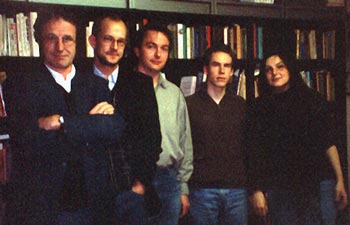|
Home
The Project
News
Edition
Editorial Board
Biography
Literary Estate
Bibliography
Links
Project Team
Imprint
German Version
|
![]()
|
![]()
|
|
Project Team of the FWF project that took place at the Institute Vienna Circle between 2002 and 2009:
Vienna
Contact
The work of the project teams in Vienna and Graz is being
funded by the Austrian
Science Fund (FWF).
|
|

Friedrich Stadler, Matthias Neuber,
Christian Damböck, Edwin Glassner and Heidi König
|
|
Friedrich
Stadler - Project director
Born 1951 in Zeltweg (A). Studies in history,
philosophy and psychology at the Universities of Graz and
Salzburg, 1977 Mag.phil, 1982 Dr.phil; since 1989 Lecturer.
1994 Habilitation for "History and Philosophy of Science"
at the University of Vienna. Head of the
Department of Contemporary History, University of Vienna, founder and scientific director of the Institute Vienna Circle.
|
|
| |
|
Matthias Neuber - Scientific assistant
and co-editor of volume 2
Born in 1970 in Stuttgart, studies in
philosophy and linguistics at the University of Munich, research
and teaching positions at the universities of Berlin, Seattle,
and Tübingen. Dissertation project on Schlick's theory of
objectivity.
|
|
| |
|
Christian
Damböck - Scientific assistant
Born in 1968 in St. Pölten (A), studies
in philosophy at the University of Vienna with focus on mathematics
and history, Mag.phil 1998, PhD 2005.
|
|
| |
| Edwin
Glassner - Scientific assistant and co-editor of volume 5
Born in 1980 in Vienna (A), studies in
philosophy with focus on linguistics as well as international
business at the University of Vienna, Mag. phil. 2003, dissertation
project on Wittgenstein's later philosophy.
|
|
| |
| Heidi König - Scientific
assistant and co-editor of volume 5
Born in 1965 in Steyr (A), 1984-88 studies
in linguistics, psychology and literature; 1995-2000 studies
in translational sciences at the University of Vienna. Mag.
phil 2000.
|
|
| |
|
Reinhard Fabian
Born 1943. Studies in philosophy and classical philology at the universities of Graz and Göttingen. 1972 degree of Dr.phil.; 1972-1983 Research and Teaching Assistant (Vertragsassistent) at the University of Graz; research projects on Austrian Philosophy, work on the literary estates of Ehrenfels, Höfler, Mach, Marty, Meinong, Neurath, Schlick; edition of the philosophical writings of Christian von Ehrenfels (4 Volumes, 1982-1990). Since 1985 co-director of the "Research and Documentation Center for Austrian Philosophy" in Graz.
|
|
| |
|
Heiner Rutte - Co-editor of Volume 5
Born 1945. Associate Professor of Philosophy at the University of Graz. 1965-1971 studies in philosophy and history at the University of Graz. 1971 degree of Dr.phil., Assistant Professor ( Univ.-Assistent). 1981 Habilitation; since 1989 Associate Professor (a.o.Univ.-Prof.). Research and publications on the "Vienna Circle", on Schlick, Neurath, Popper, Brentano, Zilsel, H. Gomperz, and on general problems of the philosophy of empiricism.
|
|
| |
|
Johannes Friedl - Scientific assistant, co-editor of Volume 5
Born 1972 in Schärding, Upper Austria; 1991 to 1996 studies in philosophy at the University of Vienna, from 1996 onwards at the University of Graz. 2001 Master's degree in philosophy; Master's thesis on the philosophy of mind. Doctoral studies at the University of Graz.
|
|
| |
|
Mathias Iven - Scientific assistant, editor of volume 3
Born 1960 in Potsdam, Germany. Studies in philosophy, law, and psychology at the Humboldt University in Berlin. 1993 Master's degree in philosophy; 2002 degree of Dr.phil. Doctoral thesis: "'Wenn etwas Gut ist so ist es auch Göttlich.' Die Ethik im Leben Ludwig Wittgensteins".
|
|
| |
|
Massimo Ferrari
Massimo Ferrari ist Professor für Geschichte der Philosophie an der Universität L´Aquila - Italien. Schwerpunkte seiner wissenschaftlichen Tätigkeit sind die deutsche Philosophie des XIX. und XX. Jahrhunderts, insbesondere der Neukantianismus, die Marburger Schule, die Philosophie Ernst Cassirers und die philosophischen Hauptströmungen der Weimarer Zeit. Er beschäftigt sich außerdem mit der historisch-systematischen Entwicklung des Logischen Empirismus und der Analytischen Philosophie.
|
|
|
|
![]()
|
![]()
|
|

